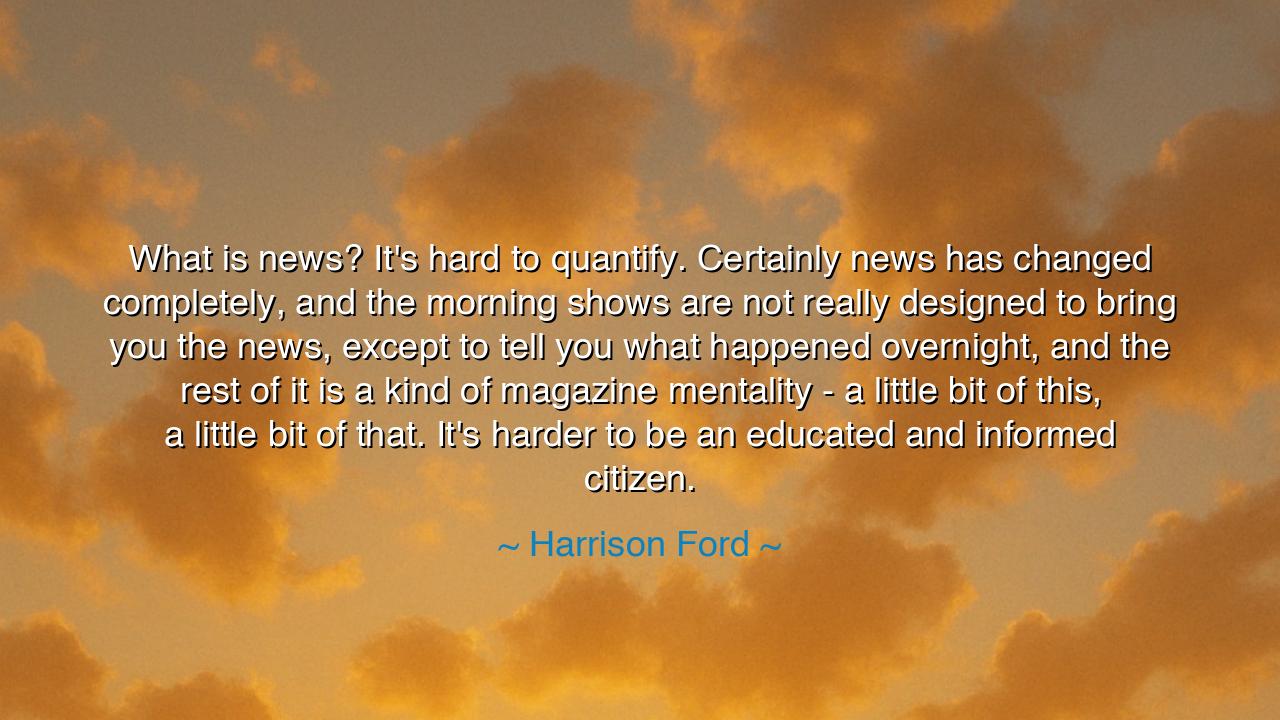
What is news? It's hard to quantify. Certainly news has changed
What is news? It's hard to quantify. Certainly news has changed completely, and the morning shows are not really designed to bring you the news, except to tell you what happened overnight, and the rest of it is a kind of magazine mentality - a little bit of this, a little bit of that. It's harder to be an educated and informed citizen.






"What is news? It's hard to quantify. Certainly news has changed completely, and the morning shows are not really designed to bring you the news, except to tell you what happened overnight, and the rest of it is a kind of magazine mentality - a little bit of this, a little bit of that. It's harder to be an educated and informed citizen." These words by Harrison Ford carry a profound reflection on the shifting nature of news and the challenges of staying informed in an age where information is often fragmented and sensationalized. Ford’s critique of modern media, particularly the morning shows and their focus on entertainment rather than serious journalism, speaks to the erosion of the traditional role of news as a tool for education, understanding, and critical thinking.
In the ancient world, news was something much more localized and contextual. The Greeks, for example, shared important updates and debates in public forums, where citizens gathered to discuss the state of affairs and the welfare of the polis. The forum was where news had the power to shape society, to inform decisions, and to build civic identity. However, even in their time, those who shaped the narrative—the philosophers, orators, and leaders—had the power to distort what the public knew. Socrates, the wise and questioning philosopher, often noted how false knowledge could lead society astray, a lesson that echoes Ford's critique of our modern media environment.
The idea of truth and education being intertwined with news is also present in the ancient writings of Plato, who in his work The Republic explored the importance of an informed society for the health of the state. The philosopher-king, according to Plato, would be a leader who sought truth and wisdom—not superficial entertainment or sensationalism—and used these to guide the people. Plato’s ideal was one where citizens, equipped with true knowledge, could participate in the creation of a just society. Ford’s lament on the state of modern media reflects the very concerns Plato had about how misinformation or distractions could prevent people from being educated and informed citizens, capable of making wise decisions for the common good.
This shift that Ford speaks of—from informative news to the magazine mentality of modern broadcasts—was not instantaneous. Rather, it grew over time, as the demands of the advertising world, commercialization, and the need for ratings began to shape what was considered newsworthy. In the early 20th century, newspapers like the New York Times and The Guardian held a certain prestige for their dedicated reporting on politics, economics, and global events. Over time, however, the drive for profits and the increasing role of visual media pushed news outlets to seek quick entertainment rather than careful, investigative reporting. As the internet and cable television grew, so too did the rise of outlets that sought to entertain rather than inform, prioritizing clickbait and soundbites over depth and context.
The lessons of history are clear: a society's strength lies not only in its ability to defend itself or acquire wealth but in the quality of information its citizens possess. The Roman Empire, for example, relied heavily on its orators and public speakers to convey important messages. Leaders like Cicero understood the power of rhetoric and truth to unite or divide the people. His speeches, which covered everything from justice to ethics, held the power to influence the course of history. In much the same way, Ford’s commentary on the shallow nature of modern media warns of the dangers of a society where information becomes distorted or commodified, leading to uninformed decisions and a disengaged populace.
The lesson in Ford's words is as much about critical thinking as it is about the need for vigilance in how we consume information. Just as Socrates questioned the assumptions of his time, we must now question the narratives presented by modern media. It is easy to be swept away by the glamour and entertainment of the modern world, but it is in the deeper, more deliberate pursuit of truth that we find our strength as individuals and as a society. We must not be passive consumers of news but active participants in seeking out the facts, questioning the sources, and rejecting information that serves only to distract rather than educate.
In our own lives, let us take this wisdom into the present day. We are bombarded with countless sources of information, many of which prioritize entertainment over substance. But we must strive to be discerning in what we read, what we watch, and what we share. Whether it is through reading in-depth articles, engaging in thoughtful discussions, or seeking out diverse viewpoints, we must cultivate the habit of being informed, reflecting critically, and sharing knowledge that serves the common good. The true strength of a society lies in its capacity to engage its citizens not with distractions but with meaningful information that empowers them to act with wisdom and integrity. In this way, we honor the ancient wisdom that knowledge is not just power but the foundation of a just and thoughtful society.






AAdministratorAdministrator
Welcome, honored guests. Please leave a comment, we will respond soon